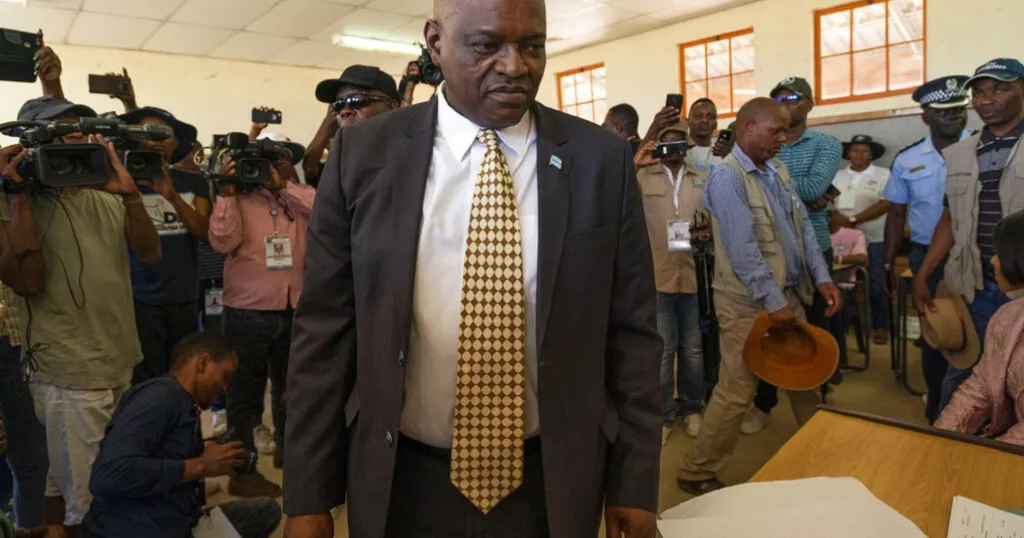Botswana Faces Economic Challenges Ahead of Upcoming General Election
3 min read
FILE - In this Oct. 23, 2019, file photo, Botswana President Mokgweetsi Masisi arrives to vote in Botswana's general elections in Moshupa, Botswana.

FILE - In this Oct. 23, 2019, file photo, Botswana President Mokgweetsi Masisi arrives to vote in Botswana's general elections in Moshupa, Botswana.
Botswana, renowned for its long-standing democratic tradition, is poised to hold its general election on October 30, as announced by President Mokgweetsi Masisi. This election is pivotal, as Masisi seeks to secure a second and final term after his candidacy was endorsed by the ruling Botswana Democratic Party (BDP).
The outcome of this election will not only shape the composition of Parliament but also determine the lawmakers responsible for selecting the next president. However, it comes at a time of economic uncertainty for a nation heavily reliant on diamond mining.
As the world’s second-largest diamond producer, following Russia, Botswana has been a significant player in the global diamond market. Recent reports indicate that the country has produced some of the largest rough diamonds in the past decade. Yet, the industry faces serious challenges: sales of rough diamonds at Debswana, a joint venture between the Botswana government and the De Beers Group, have dropped nearly 50% in the first half of 2024. This decline has severely impacted government finances and sparked criticism of President Masisi and the BDP for their failure to diversify the economy.
Unemployment rates have surged, exceeding 27%, while youth unemployment has reached an alarming 45%. The economic strain has also resulted in delays in salary payments for government employees, undermining Botswana’s reputation for effective governance and raising concerns about potential austerity measures.
“It is the first time in over forty years that the state finances are in the red,” remarked opposition figure Rev. Prince Dibeela. He added, “There are also over 200,000 young individuals who are qualified but unable to secure employment. Our society is highly fragmented.”
In response to these economic challenges, the ruling BDP has vowed to prioritize the diversification of Botswana’s economy, which boasts a GDP of approximately $21 billion. According to the International Monetary Fund (IMF), diamond mining and sales constitute 80% of Botswana’s exports, one-third of its fiscal revenue, and a quarter of its GDP. This heavy dependence underscores the urgent need for economic diversification.
Lebogang Kwape, the BDP’s Deputy Secretary-General and current foreign minister, stated, “The Botswana Democratic Party is prepared to serve the citizens of Botswana with commitments that align closely with their aspirations. We have attentively listened to the concerns of all Batswana and developed a manifesto that genuinely addresses their needs with both realism and sincerity.”
The BDP’s strategy includes a focus on processing mineral resources to create new revenue streams and enhancing the agriculture and tourism sectors. These initiatives aim to alleviate the pressure on the economy and reduce unemployment rates.
According to the Independent Electoral Commission, which oversees the electoral process, more than one million citizens have registered to vote, with rising unemployment being a major concern for many voters. Botswana, a nation larger than France but with a population of only 2.5 million, faces additional challenges due to significant portions of its territory being covered by the Kalahari Desert, which borders South Africa. Issues such as drought and desertification pose serious threats to the country’s development and the livelihoods of its residents.
Three candidates have officially registered to run against Masisi: Duma Boko from the main opposition Umbrella for Democratic Change party, Dumelang Saleshando of the Botswana Congress Party, and Mephato Reatile from the Botswana Patriotic Front. This election is also set to reignite Masisi’s ongoing conflict with former President Ian Khama, his predecessor. Khama, the son of Botswana’s founding president, left the BDP and went into exile in South Africa in 2021, alleging that Masisi had adopted an authoritarian stance towards dissent.
In September, Khama returned to Botswana for a court hearing and has been actively campaigning for the Botswana Patriotic Front to help remove Masisi from office.
Masisi, 63, is a former high school teacher with experience at the United Nations Children’s Fund (UNICEF). He has served as the fifth president of Botswana since the country gained independence from Britain. The BDP has maintained control since 1966, and this election presents a critical moment in Botswana’s democratic journey, one that will likely impact the nation’s economic future and social cohesion for years to come.